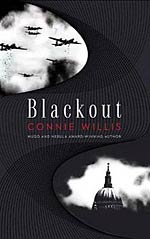
![]() dh65
dh65
7/22/2012
![]()
I've just finished Blackout and I'm about to begin All Clear. Because they were published as two books, I think Blackout should be reviewed on its own. After all, people who invest the time and money in a book deserve one that can stand on its own. And Blackout cannot. Unless you plan on committing to both books, don't bother with Blackout. I hope, however, to be able to say after reading All Clear that the two books, read together, are worth your time and money.
At some point, it must have become clear to Willis and her editor that her manuscript would end up well beyond 1,000 pages when published. At that point, they faced a basic choice: (1) publish it as a single, big book; (2) publish it in two parts; or (3) cut it by at least a couple of hundred pages. I think they took the worst of the three options.
Publishing the novel in one volume would have meant an expensive book that might have reduced sales, but it would have been honest from a creative standpoint since there was really no way to cut it into books that could stand alone.
The right choice would have been to cut the manuscript enough to allay concerns about its being too large for a single volume. That would have been the right choice not only because it would have resolved the publishing quandry but also because it would have resulted in a much better novel. I love Connie Willis's other time-travel books but this one suffers from sprawl, repetitiveness, and needless drawing out of episodes in the narrative that could have been easily and profitably shortened.
Blackout consists of three primary narrative threads, which tell structurally parallel stories that eventually, after about 450 (out of 491) pages, begin to converge. The basic outline of those threads is this: a historian goes back in time to 1940, finds that he/she cannot return to 2060 the way he/she came, and begins to freak out about it and find another way home.
Within each of those threads is endless repetition of certain characteristic narrative techniques. A character makes an assumption, finds she's wrong, then makes another, finds it's wrong, ad infinitum. Or a character is hoping for something to happen, thinks it has, then finds out it hasn't, then thinks it has (finally), then finds out it still hasn't, ad infinitum. The characters are tense almost all the time, but their tension isn't mirrored by effective narrative tension so much as by irritation at the repetitiveness.
Willis uses these stock techniques to fit in a huge amount of mostly fascinating detail about the War. But while the detail is interesting from a historical perspective, it's often not useful from a narrative one. The effect is often, then, a book you keep reading because the factual details are interesting but the fictional story is not.
I'm certainly going to read All Clear, and I hope that, at the end of it, I'll be able to say the the whole two-volume novel is brilliant, even if the division into two books doesn't work or make sense. But my gut feeling after reading the first part is that my criticisms about the writing will probably apply to the whole. Willis is more than capable of creating page-turners that you can't put down because of the dramatic tension (e.g., Doomsday Book). Maybe she pulls that off in All Clear. But not in Blackout.